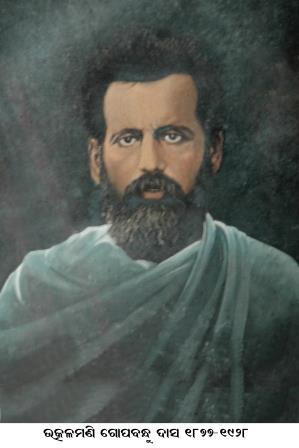Utkalamani Gopabandhu Das
Died :- 17-Jun-1928
Place of Birth :- Suaando, Puri

Popularly known as Utkalmani, the Jewel of Utkal or Odisha, Gopabandhu Das will be ever remembered by the people of Odisha for his supreme sacrifices to serve the poor and the distressed, his role in protecting the dignity of Odia language and creation of a separate Odisha province, his sincere attempt to spread of education, as a social reformer, a nationalist leader, a journalist in furthering people’s interest and, above all, as a poet.
Gopabandhu Das was born on 9 October, 1877 in Suando village, near Puri to father Daitari Das and mother Swarnamayee Devi. His father being a mukhtiar, the family was well-off. Gopabandhu married at the age of twelve but continued his education. He had basic schooling in the village and middle school education at Rupadeipur, a nearby village. In 1893, he joined Puri Zilla School where he was influenced by a teacher, Mukhtiar Ramchandra Das, who was both a nationalist and a proponent of public service in aid of the poor and the distressed. The inadequate response of authorities for the victims of a severe cholera prompted him to start a voluntary corps called Puri Seva Samiti whose members helped the suffering masses and also cremated the dead.
Following his father’s death, Gopabandhu had his education at the Ravenshaw College in Cuttack. He became a regular contributor to local literary magazines, Indradhanu and Bijuli, in which he argued that any modern literary movement, just like any modern nation, could not be a clean break from the past but rather had to acknowledge and base itself on its past.
It was while at Ravenshaw that his new-born son died but he explained his preference to serve the flood victims rather than attend to his ailing son.
Gopabandhu proceeded to Calcutta University, where he obtained an MA and LL.B. while simultaneously working for education of the Odia people living there. His wife died on the day he heard that he had passed his law examination. Now aged 28 and all three sons dead, he chose to give up care of his two daughters to an older brother along with his share of property in Suando.
In 1909, Madhusudan Das appointed him as State Pleader for the princely state of Mayurbhanj. But finding that law did not interest him, he gave up his practice.
In 1909, Gopabandhu established the Satyabadi Bana Bidyalaya in the Gurukul tradition with a view to creating a set of nationalists who would be aware of their duty to their country and the people.
At the instance of Madhusudan Das, Gopabandhu contested election and was elected to the Legislative Council in 1917. There his priority was unification of Odia speaking tracts, eradication of famine and flood in Odisha, restoration of the right to manufacture salt without excise duty and expansion of education.
Prior to his Legislative Council role, Gopabandhu had become a member of Utkal Sammilani from 1903 and was its president in 1919. He also became a member of the Indian National Congress. At the All India Congress Committee at Calcutta and Nagpur he persuaded Mahatma Gandhi to adopt the Utkal Sammilani's primary goal of organising states on the basis of language. He became the first president of Utkal Pradesh Congress Committee in 1920, holding the post until 1928 and he welcomed Gandhi to the province in 1921.
Gopabandhu was arrested in 1921 for reporting the alleged molestation of a woman by police but was acquitted of the charges. He was arrested again in 1922, when he received a two-year prison sentence. He was released from Hazaribagh jail on 26 June 1924.
Gopabandhu saw journalism as a means to educate the masses. In 1919, he started a weekly newspaper called the Samaja which became a daily publication in 1927. Eventually it became an instrument of the national movement.
Sometime after meeting Lala Lajpat Rai at a Congress session in 1920, Gopabandhu was persuaded to join the Lok Sevak Mandal. The newspaper became a means of promoting it, He served as editor until his death but before that he bequeathed it to the Society.
Gopabandhu became All India Vice-President of the Lok Sevak Mandal in April 1928. He became ill while attending a society meeting in Lahore and died on 17 June, 1928.
As a poet, his works include Karakabita, Bandira Atmakatha, Dhramapada, Abakasa-chinta, Go-mahatma, Nachiketa upakhyana, Dase apanenka chi?hipatra and Gopabandhu rachanaba?i: Siksha, sikshaka o chhatra.
Books
Poetry
Copyright © 2024 Odia Virtual Academy. All rights reserved Total Visitors- 1
Powered by: Odia Virtual Academy

